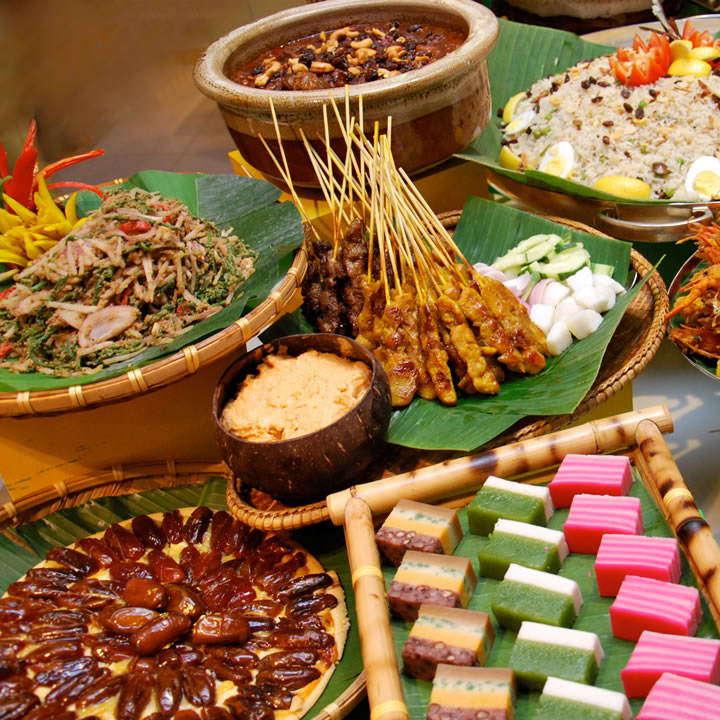In the heart of Malaysia’s vibrant cultural tapestry lies a remarkable thread that binds communities together—food.
Malaysia‘s diverse population, a harmonious blend of Malay, Chinese, Indian, and indigenous cultures, has woven an intricate culinary narrative that reflects the nation’s unity. Beyond the mere act of sustenance, food here encapsulates stories of tradition, history, and togetherness.
As you step into the bustling streets of Malaysia, a symphony of aromas dances in the air, beckoning you to explore the culinary treasures the country has to offer. Each food festival in Malaysia is more than a gastronomic delight; it’s a celebration of identity, a moment of reflection, and an opportunity to share in the richness of cultures that have come together over centuries.
Ramadan Bazaars
The crescent moon ushers in the sacred month of Ramadan, a time of self-reflection and spiritual renewal for Malaysia’s Muslim population.
Beyond the personal journey of fasting, Ramadan Bazaars stand as an embodiment of unity. As the sun sets and the call to prayer fills the air, these bazaars come alive with bustling energy.
The fragrant smoke of grilling satay mingles with the sweetness of “bubur lambuk”, a rice porridge shared among neighbors.
Malaysians of all backgrounds gather at these bazaars, not only to indulge in delectable treats but to partake in the sense of community that embodies the true spirit of Ramadan.
Here, food becomes a bridge that connects hearts, fostering a deeper understanding of the shared human experience.
Chinese New Year Feasts
As the Lunar New Year approaches, a vibrant wave of red and gold sweeps across Malaysia, ushering in the auspicious Chinese New Year. This festival is more than just a celebration; it’s a symphony of cultural heritage and culinary creativity.
In homes adorned with lanterns, families gather to prepare and share auspicious dishes that carry profound meanings. The iconic yee sang, a colorful raw fish salad, symbolizes prosperity and togetherness, with each ingredient representing a different aspect of life.
And then there’s the tangyuan, glutinous rice balls served in a sweet syrup, embodying unity and the coming together of generations.
Chinese New Year illustrates the importance of family bonds and the passing down of traditions.
As you take a bite of crispy bak kwa or sip on warming chrysanthemum tea, you’re not just tasting the culinary brilliance of the festival but also immersing yourself in a cultural legacy that continues to flourish through generations.
Deepavali Delights
With the arrival of Deepavali, the Festival of Lights, Malaysia becomes a canvas painted in a myriad of vibrant hues. Deepavali is a celebration of the triumph of light over darkness and good over evil, and food plays a central role in this luminous festival.
The scent of ghee-laden sweets like murukku and ladoo wafts through the air, inviting all to partake in the joyous occasion.
Amidst the exchange of cheerful greetings and the flicker of oil lamps, families and friends gather to share plates filled with rich curries, crispy papadums, and a splendid array of sweets.
Deepavali is a reminder that diversity is not just accepted, but celebrated. It’s a time to reflect on the beauty of unity through variation. Each dish is a story of tradition, a testament to the vibrant culture that weaves Malaysia’s societal fabric.
Hari Raya Open Houses
As the crescent moon graces the sky, signaling the end of Ramadan, Malaysia transforms into a tapestry of lights, colors, and laughter for Hari Raya Aidilfitri. This festival, also known as Eid, is a joyous celebration of gratitude and unity.
Central to the festivities are the iconic traditional Malay cookies, or kuih, lovingly prepared by families and shared with neighbors and friends. These bite-sized delicacies come in an array of shapes and flavors, symbolizing the diversity that forms the heart of the nation.
Hari Raya Aidilfitri is not just about indulging in culinary delights, but about the act of giving and receiving, of expressing love and appreciation.
Sabah Harvest Festival
In the verdant landscapes of Sabah, the indigenous Kadazan-Dusun community comes together to celebrate the Pesta Kaamatan, the Harvest Festival. At the heart of this festival is the Unduk Ngadau pageant, where young women showcase grace, beauty, and their deep connection to their cultural roots.
The Unduk Ngadau pageant is a reflection of Sabah’s rich diversity, echoing the festival’s theme of unity in diversity. Traditional foods take center stage during this celebration, with dishes like hinava, a raw fish salad, and bambangan, a pickled wild mango, capturing the essence of Sabah’s natural bounty.
As we delve into these unique flavors, we’re invited to explore the depth of Sabah’s indigenous culture. The Harvest Festival not only pays homage to the land but also to the strength and resilience of its people.
Conclusion
As we journey through Malaysia’s food festivals, we’re transported beyond the realm of taste. These celebrations offer a lens through which we witness the intertwined threads of humanity, belief, and harmony.
With every dish, every embrace, and every shared moment, these festivals remind us that in diversity lies a tapestry of shared experiences, making our Malaysian culinary journey not only delicious but heartwarmingly contemplative.

